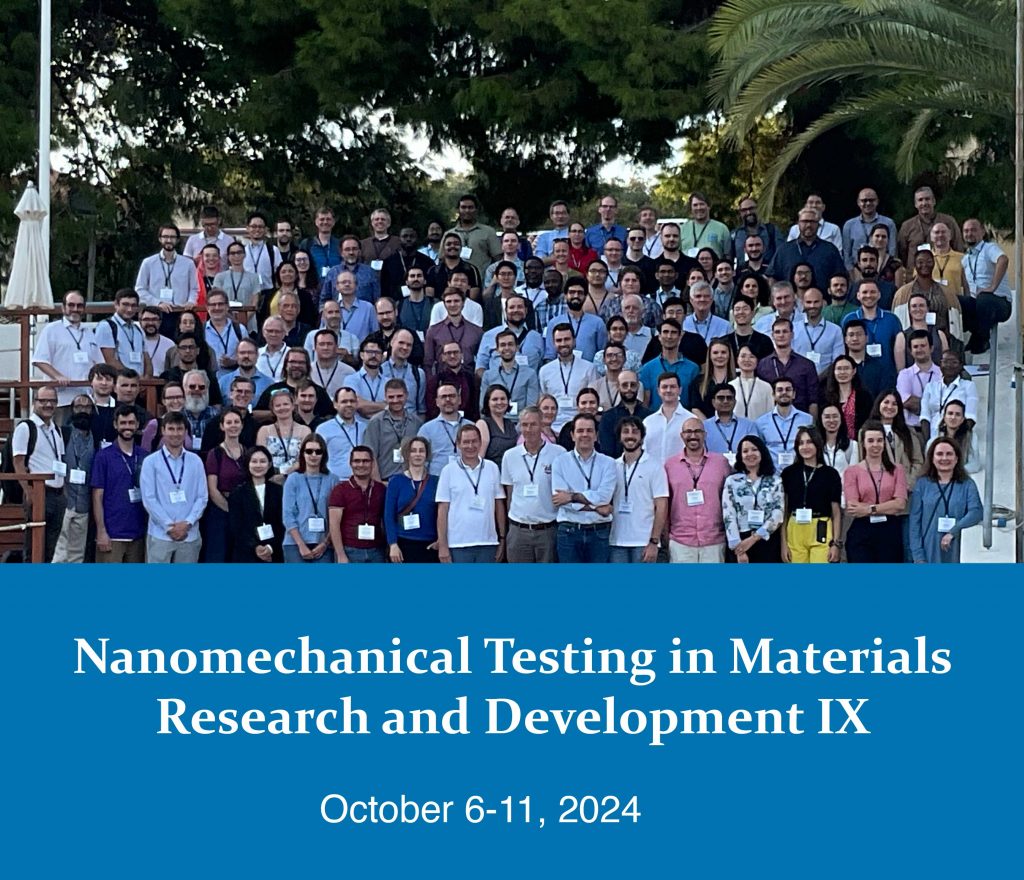An ECI Conference Series

October 4 - 9, 2026
Rhodes, Greece
Welcome From The Chair
Dear friends and colleagues in the nanomechanical testing community,
We are delighted to announce the 10th ECI Nanomechanical Testing in Research and Development, to be held October 4–9, 2026, on the beautiful and historic island of Rhodes, Greece.
This conference will once again bring together leading researchers and industrial experts working in the field of nano- and micromechanical testing in materials science and engineering. The mechanical behavior of materials arises from complex processes spanning multiple length, time, and temperature scales. Understanding and controlling these mechanisms is key to driving innovation across a wide range of materials and applications.
Following the success of the previous nine meetings in this series, ECI Nanomechanical Testing will continue the tradition of a stimulating technical program in a relaxed and collaborative atmosphere. Delegates can look forward to vibrant discussions, meaningful networking, and the chance to enjoy the world-class cultural and recreational opportunities that Rhodes has to offer, just steps away from one of the ancient Seven Wonders of the World.
Recent years have seen rapid advances in experimental approaches to probe elastic, plastic, fracture, and fatigue behavior at the nano- and microscale. New techniques now enable precise control of loading, temperature, and environment, often coupled with in-situ imaging, opening exciting avenues for studying materials under realistic and extreme conditions. The integration of machine learning and modeling approaches further enhances our understanding of materials behavior across multiple scales.
Our field plays a crucial role in tackling societal and technological challenges, and we look forward to providing a venue for the community to reconnect, exchange ideas, and inspire future innovation.
Please mark your calendars for October 4–9, 2026, and stay tuned for further details on abstract submission, registration, and program highlights.
We can’t wait to welcome you to Rhodes in 2026!
Warm regards,
Verena Maier-Kiener and all members of the Steering Committee
About This Conference
This conference will bring together researchers and industrial stakeholders working in the field of nano- and micromechanical testing in materials science and engineering. The mechanical behavior of materials is governed by complex processes that span multiple length, time, and temperature scales. Understanding and controlling these processes is essential for advancing materials innovation across a broad range of applications.
In recent years, there has been a rapid development of experimental strategies for investigating elastic, plastic, fracture, and fatigue properties at the nano- and microscale. These techniques enable precise control over loading mode, temperature, and environment, often integrating real-time imaging and multiphysics signal acquisition during deformation. This has opened new possibilities for studying materials under realistic and even extreme conditions.
The conference will provide a platform for the experimental mechanics community to exchange insights on cutting-edge nanomechanical testing methods, with particular emphasis on:
- Novel nanoindentation and testing techniques – Advanced hardware and data analysis methods for characterizing complex materials with improved resolution and sensitivity.
- Multiscale deformation and failure mechanisms – Observations of mechanical behavior from atomic to mesoscale, bridging the gap between different length scales.
- In-situ and operando nanomechanics – Mechanical testing combined with SEM, TEM, AFM, X-ray, neutron, and electron-based imaging and diffraction methods.
- Correlative mechanical microscopy – Use of multimodal probes (photon, phonon, electron, ion) to study deformation processes in advanced structural materials.
- Nanomechanics under extreme conditions – Testing at high or cryogenic temperatures, under high strain rates, or in harsh environments such as aggressive atmospheres or radiation.
- Advanced strain measurement and data analysis – Full-field imaging, volume correlation, and time-resolved experiments to investigate dynamic, far-from-equilibrium processes.
- Integrated modeling and characterization – Coupling experiments with modeling for mechanistic discovery, parameter calibration, and model validation.
- Artificial intelligence and data-driven methods – Applying machine learning and informatics to nanomechanics for pattern recognition, prediction, and insight generation.
- Industrial applications – Translating advanced testing methods to industry-relevant materials and devices, including energy systems, coatings, composites, biomedical materials, and 3D-printed components.
Modern nanomechanical testing not only enables quantitative evaluation of hardness, creep, phase transformations, fracture, and toughness, but also allows for the study of rate- and environment-dependent behavior. These insights support the development of materials with tailored local properties and help to uncover the mechanisms underlying complex deformation and failure processes.
This conference with a longstanding tradition in the field of micro- and nanomechanics will serve again as a vibrant forum for presenting the latest developments, fostering interdisciplinary collaboration, and exploring the future of nanomechanical testing in research and development.
Conference Organization
Conference Chair
Verena Maier-Kiener
Montan Universität Leoben, Austria
Steering Committee
Gerhard Dehm, Planck Institute for Iron Research, Germany
Karsten Durst, Technical University Darmstadt, Germany
Mathias Göken, University Erlangen-Nurnberg, Germany
Sandra Korte-Kerzel, RWTH Aachen University, Germany
Marc Legros, CEMES-CNRS, France
Johann Michler, EMPA, Switzerland
Jon Molina-Aldareguia, IMDEA Materials Institute, Spain
George M. Pharr, Texas A&M University, USA
Marco Sebastiani, Universita degli studi Roma Tre
Sponsorship Opportunities
Package A: $1,650
- Name of company on Sponsor List in Program
- Company logo displayed on screen between sessions
Package B: $2,750
- Half-page ad in program booklet
- Name of Company on Sponsor List in Program
- Company Logo displayed on screen between sessions
- Company logo & link on conference website
Package C: $3,850
- Table to display company information
- Full page ad in program
- Name of company Sponsor List in Program
- Company Logo & link on conference website
- Company Logo displayed on screen between sessions
Package D: $5,500
- Table to display company information
- Promotional Poster Presentation during conference poster sessions
- Large company logo and link on conference website
- Full page ad in program
- Company logo displayed on screen between sessions
- Name of company on sponsor list in program
ECI Associate Director Kevin Korpics (kevin@engconfintl.org) may be contacted for invoicing or other questions. Payment can be made via check, bank transfer or credit card*. Please reference the conference title or code (26-AN) when making payment.
Please note that none of the sponsor packages include free or discounted registrations for attendees from sponsor companies. Attendees from sponsor companies are required to pay the conference fee as well.
*A 3.5% processing fee will be applied to credit card payments
Venue and Transportation Information
Photo from 2024 Conference

Previous Conferences in This Series
Instrumented Indentation Testing in Materials Research & Development
October 9 – 15, 2005 – Crete, Greece
Conference Chairs:
George M. Pharr, University of Tennessee, USA
Carl McHargue, University of Tennessee, USA
Nanomechanical Testing in Materials Research & Development II
October 11 – 16, 2009 – Barga, Italy
Conference Chair:
Mathias Göken, University Erlangen-Nurnberg, Germany
Nanomechanical Testing in Materials Research & Development III
October 9 – 14, 2011 – Lanzarote, Canary Islands, Spain
Conference Chair:
Gerhard Dehm, University of Leoben, Austria
Nanomechanical Testing in Materials Research & Development IV
October 6 – 11, 2013 – Albufeira, Portugal
Conference Chair:
Johann Michler, EMPA, Switzerland
Nanomechanical Testing in Materials Research & Development V
October 4-9, 2015 – Albufeira, Portugal
Conference Chair:
Marc Legros, CEMES-CNRS, France
Nanomechanical Testing in Materials Research & Development VI
October 1-6, 2017 – Dubrovnik, Croatia
Conference Chair:
Karsten Durst, Technical University of Darmstadt, Germany
Nanomechanical Testing in Materials Research & Development VII
September 29-October 4, 2019 – Torremolinos/Malaga, Spain
Conference Chair
Jon Molina-Adlareguia, IMDEA Materials Institute, Spain
Nanomechanical Testing in Materials Research & Development VIII
October 2-7, 2022 – Split, Croatia
Conference Chair
Sandra Korte-Kerzel, RWTH Aachen University, Germany
Nanomechanical Testing in Materials Research and Development IX
October 6-11, 2024 – Giardini Naxos, Messina (Sicily), Italy
Conference Chair
Marco Sebastiani, Universita degli studi Roma Tre, Italy
ECI General Information
Engineering Conferences International (ECI) is a not-for-profit, global engineering conferences program, originally established in 1962 that provides opportunities for the exploration of problems and issues of concern to engineers and scientists from many disciplines.
The format of the conference provides morning and late afternoon or evening sessions in which major presentations are made. Poster sessions will be scheduled for evening discussion as well. Available time is included during the afternoons for ad hoc meetings, informal discussions, and/or recreation. This format is designed to enhance rapport among participants and promote dialogue on the development of the meeting. We believe the conferences have been instrumental in generating ideas and disseminating information to a greater extent than is possible through more conventional forums.
All participants are expected both to attend the entire conference and to contribute actively to the discussions. The recording/photographing of lectures and presentations is forbidden. As ECI conferences take place in an informal atmosphere, casual clothing is the usual attire.
Smoking is prohibited at ECI conferences and conference functions.

